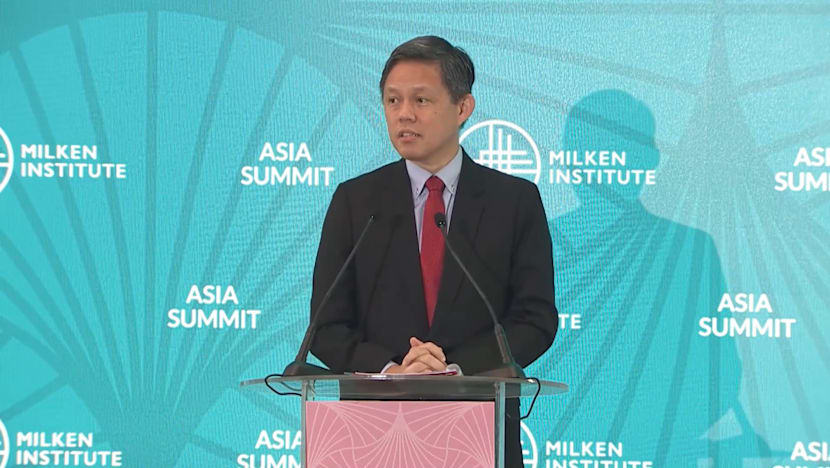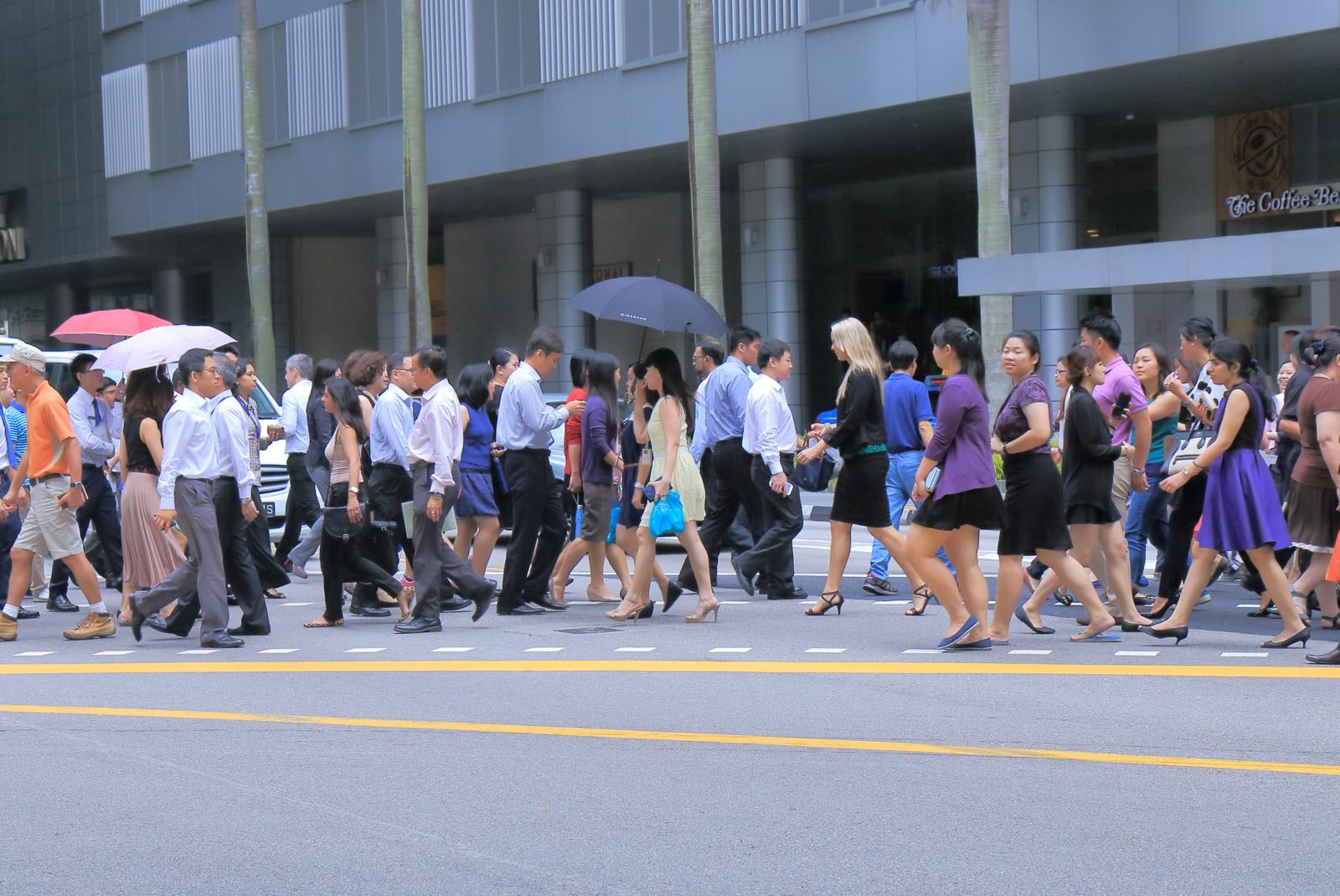Business leaders have responsibility to shape outcomes in fragmented world: Chan Chun Sing
Describing the two extremes of global fragmentation and integration, the defence minister said corporate leaders need to raise their voices for the type of world they want to see.

Defence Minister and Coordinating Minister for Public Services Chan Chun Sing speaking at the 12th annual Milken Institute Asia Summit on Oct 1, 2025. (Screengrab/Milken Institute webpage)

This audio is generated by an AI tool.
SINGAPORE: Business leaders can be “architects of change” and shape global outcomes in an increasingly fragmented world, said Defence Minister Chan Chun Sing on Wednesday (Oct 1).
“Governments can set policies, but markets, industries and enterprises will shape the outcome,” said Mr Chan, who is also Coordinating Minister for Public Services.
He was speaking at this year’s Milken Institute Asia Summit in Singapore to an audience of enterprise and business leaders at the Four Seasons Hotel. The annual event, which is in its 12th edition, brings together leaders in business, finance, government, health care, technology and philanthropy, with an expected turnout of 1,200 participants from 43 countries.
Its speakers include founder and chief executive officer of tech firm Sea Limited Forrest Li, executive director and CEO of Temasek International Dilhan Pillay Sandrasegara and Mr Rodrigo Kede Lima, president of Microsoft Asia, according to the organiser's website.
In his speech, Mr Chan said businesses can play a bigger role in making globalisation work for everyone.
He urged corporate leaders to raise their voices amid a fracturing world order.
“Your voices must be heard in your respective countries at the political level, you must give confidence to your own leaders that this is what the business community and the market desire,” he said.
“You will have the responsibility, you will also have the agency to try to counterbalance the worst of the nativist instincts that comes from the uncertainties that our people are facing.”
This is especially crucial in a world at the crossroads of two extremes, he said.
One extreme is where the world continues to fragment, with countries going into different blocs, and overall the global economic potential is “diminished because we are all trying to optimise at the local level”.
The other end of the spectrum is one of greater global integration, which Mr Chan described as a “happily ever after” model.
Mr Chan said businesses, being rich in resources that could rival that of small nations, have a say in the direction the world is headed.
“All of us here in this room are probably leaders in different industries and different sectors, and all of us will have a role, have a responsibility and the agency to shape the outcome of where we want to go from the two extreme bookends that I described,” he said.
ENLIGHTENED SELF-INTEREST
To that end, Mr Chan offered two suggestions on what business leaders can do.
Businesses should firstly push for new models of collaboration, greater integration and a “fresh set of rules to guide the new economy”.
But on the other hand, if businesses succumb to their own protectionist tendencies, then the “prisoners' dilemma” could rear its head in which “each and every one tries to optimise our own outcomes, but we end up with a worse collective outcome”, he said, referring to the concept that is a part of game theory.
Secondly, businesses should also invest in their people, not out of charity but because it is in the companies’ “enlightened self-interest” to do so.
This is so that workers who are likely to be displaced by the technological disruptions or the fragmented global system can have the hope that they will be taken care of, knowing that “there are people who continue to believe in them and want to invest in them and want to help them to keep pace”.
Earlier in his speech, Mr Chan noted that one of Singapore’s strengths that benefit businesses is its political stability, and that protecting the interests of its people keeps society “cohesive and united, and not be divided by the unequal distributions from the fruits of growth”.
To Mr Chan, preserving this is in the businesses’ “enlightened” interests as workers are also the electorate.
“When the people, the workers, the electorate… see the hope and the prospect for a better future with the current system, with corporates playing their role, then I think they are more likely to support the current system,” he said.
“That would help us to stave off the worst of the nativist and protectionist tendencies.”
In contrast, if businesses do not invest in the talent management and development of its people, there will be many who will fear being left behind and question why they should continue to support the system.

WHAT SINGAPORE IS DOING
On its part, Singapore will “double down” on the country’s four “man-made competitive advantages”, said Mr Chan.
The first is ensuring Singapore’s political stability so that there is policy consistency and continuity.
“There is nothing secret about Singapore's success, but there is something special about Singapore's success, and that's our ability to execute and think long-term,” he said.
“An average idea, well executed consistently over time, beats the brilliant idea that is a flash in the pan.”
He said that amid an uncertain world, businesses are looking for places where they can mobilise their capital, aggregate their talent and protect their intellectual property.
“This is something that Singapore can offer unique to the rest of the world - the ability to think long-term and the ability to execute with conviction over the long term, so that we mean what we say and we say what we mean, that businesses can continue to have the trust in us,” he said.
Secondly, Singapore will continue to consistently and fairly apply the rule of law, while allowing new innovations to take place, said Mr Chan.
Agencies in the Singapore public service are committed to making sure that its rules continue to “evolve at speed” so that new products and services can be pioneered with the necessary guardrails and in the financial markets.
“This is what Singapore intends to do to distinguish ourselves as a place with the rule of law, and more importantly, a place with the rule of law that is progressive and evolving with the needs of the times,” he said.
Thirdly, Mr Chan said Singapore must also forge new partnerships with businesses and countries, giving the examples of Singapore’s free trade agreement with the US, as well as the digital economy partnership agreements with nations such as New Zealand and Chile to promote digital trade and trusted data flows.
“And we will continue to do that, because there is nothing to say that it's inevitable the world will fragment, because I believe businesses and many other countries continue to believe in the potential of a more integrated world,” he said.
Lastly, Singapore will continue to emphasise investing in its people, said Mr Chan, highlighting initiatives like SkillsFuture that began more than a decade ago.
On this, Mr Chan said that school mainly provides a foundation for learning.
“Whoever in the world that can continue to invest in its people beyond the school years and keep its people always at the cutting edge of technology … will be the winner in the new, uncertain world,” he said.
Mr Chan then reiterated why companies should be involved in these efforts.
“(We) would like to partner you in this journey to collectively get our voices out, to say that we all would like to see a more integrated world where we have more opportunities for everyone,” he said.
“Because (then), we are able to optimise at the global level, rather than be shoehorned and restricted to our narrow local level.”

















